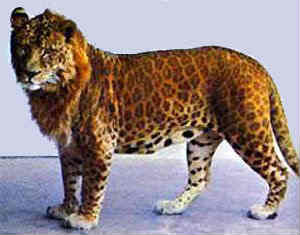Interspecific Hybridization
Biology Dictionary
EUGENE M. MCCARTHY, PHD GENETICS, ΦΒΚ
Interspecific hybridization is hybridization between organisms treated as distinct species. Use of the term has, however, been problematic since the biological species concept (BSC) says species can't interbreed. For example, many biologists would say two forms should not be treated as distinct species if they are able to hybridize. So when such forms are in fact found to interbreed, they are often officially reclassified as belonging to the same species. The question then arises whether the hybridization in question is still "interspecific." But hybrids do occur between many pairs widely accepted as separate species. For example, when a lioness crosses with a male leopard, the result is a leopon (right). Few, however, would say that lions and leopards should be treated as the same species simply because they can produce hybrids together.
Pages on this website discuss hybridization at length. However, a clear understanding of how the word species has been used — and abused — is essential to understanding hybridization, whether interspecific or intraspecific. So this site, which has hybridization and its evolutionary significance as one of its primary concerns, also examines — in detail — the difficulties inherent in biologists' use of the word species, especially in connection with hybridization (some possible solutions to those difficulties are also offered at the end of that discussion). If you want to read the pages devoted to that topic, click here.
Most shared on Macroevolution.net:
Human Origins: Are we hybrids?
On the Origins of New Forms of Life
Mammalian Hybrids
Cat-rabbit Hybrids: Fact or fiction?
Famous Biologists
Dog-cow Hybrids
Prothero: A Rebuttal
Branches of Biology
Dog-fox Hybrids
